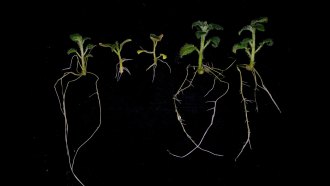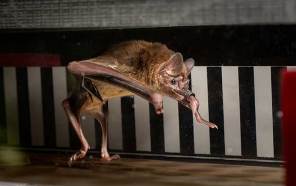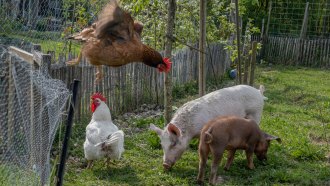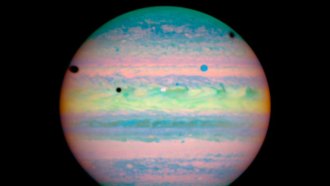All Stories
-
 Agriculture
AgricultureExploiting a genetic quirk in potatoes may cut fertilizer needs
A gene controlling potato growth limits the plant’s fertilizer uptake. Tweaking related genes could lead to more sustainable potato varieties.
-
 Animals
AnimalsPutting vampire bats on treadmills reveals an unusual metabolism
A bat gym shows that vampires are more like some insects, burning amino acids from blood proteins rather than the carbs or fats other mammals rely on.
By Susan Milius -
 Tech
TechFeather-inspired airplane flaps could boost flight performance
Rows of flaps inspired by bird wing feathers improve airfoil performance by boosting lift, reducing drag and mitigating stall.
By Nikk Ogasa -
 Anthropology
AnthropologyThe ‘midlife crisis’ is too simple a story, scientists say
Some scientists want to shift focus to the teen mental health crisis. But the course of happiness is too complex for simplistic theories, experts warn.
By Sujata Gupta -
 Humans
HumansA phone app could help people have lucid dreams
New experiments show that an app developed by researchers can boost snoozing users’ likelihood of knowing when they are having a dream.
-
 Astronomy
AstronomyA zombie star’s spiky filaments shed light on a 12th century supernova
A 3-D map of the strange remains of a supernova seen in 1181 traces the odd tendrils of gas that jut out for several light-years in all directions.
-

Rethinking archaeology and place
Editor in chief Nancy Shute discusses efforts of Indigenous people in British Columbia to preserve ancient trails.
By Nancy Shute -

-
 Health & Medicine
Health & MedicineWhy finding bird flu in a U.S. pig for the first time is raising new worries
Swine can act as so-called “mixing vessels” for human and bird flus, giving avian viruses an opportunity to adapt for spreading in people.
-
 Psychology
PsychologySmiles tweaked by AI can boost attraction, a speed-dating study shows
Using face filters to alter expressions manipulated feelings of attraction, raising questions about how such technology may influence social interactions.
-
 Planetary Science
Planetary Science50 years ago, scientists found a new moon orbiting Jupiter
In 1974, astronomers discovered Jupiter’s 13th moon. They now know of at least 95 moons and have launched missions to study some up close.
-
 Space
SpaceA distant quasar’s black hole is oddly huge for its galaxy
The black hole’s mass is over half that of all the stars in the surrounding galaxy, a record for any galaxy hosting a quasar.
By Ken Croswell